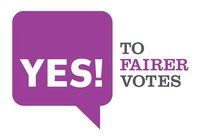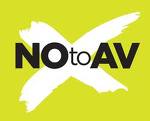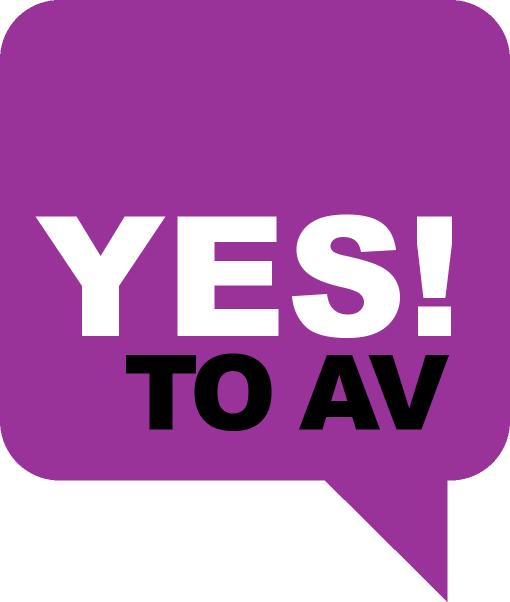Referendum News
Referendum News No. 3 – 11th April
WHO’S WHO?
Part 2 – THE OFFICIAL CAMPAIGNS
YES TO FAIRER VOTES (http://www.yestofairervotes.org/)
Although backed by the leaders of the Labour Party (Ed Milliband) and the Liberal Democrats (Nick Clegg) the group organisers have gone to great pains to downplay political support. Their launch for example was packed full of ‘celebrities’ from Eddie Izzard to Kriss Akabusi to Greg Dyke (and many more pledging support). Ironically the referendum only came about as the price for Liberal Democrat support for the Coalition but, recognising the unpopularity of politicians, especially Nick Clegg, they have shrewdly downplayed their involvement.
Whilst the Labour and Conservative parties are divided it is generally backed by most small parties and reformers as, although not a proportional system, it is felt that some reform is better than none, especially since it is nearly 100 years since MP’s have had to face any meaningful changes. Most see AV as a ‘stepping stone’ rather than an end in itself. Unsuprisingly, campaigning has largely concentrated on well worn slogans such as Making votes count i.e. no wasted votes, Fairness i.e. as to who is elected, and Change (from an oudated system). All could be used to promote support for a PR system which we feel most campaigners would if given the choice? Apart from some State funding which both sides get, the campaign is financially backed by the Electoral Reform Society and the social reformist Joseph Rowntree Reform Trust. All in all a light, open and enthusiastic campaign pulling together electoral reformers of all hues and goals desperate for some form of change.
NO TO AV (http://www.no2av.org/)
The group’s backers are much more difficult to pin down. They seem primarily to be Conservatives with a little and large C. Their launch was quite low key and their supporters low-grade politicians. The majority of the Conservative and Labour MP’s support a NO vote (fearful for their seats?) as do most Trade Unions. Unlike the YES camp however political supporters seem more content with promoting the NO vote via their own groups e.g. PM David Cameron launched his own party’s NO campaign. The Campaign Director Matthew Elliot also runs the right wing pressure group the Taxpayers’ Alliance. Their campaign largely consists of running ‘scare’ stories against change e.g. AV will cost an extra £250m and slogans rather than analysis in favour of the present system e.g. One person One vote.
Their financial backers are even more shadowy. One Conservative peer, Lord Edmiston, has been quoted as donating “a significant sum”. We guess others will have a similar background.
Although the NO campaign is well connected in the media and has access to funds it doesn’t have the enthusiasm of the YES campaigners. Many more activists are likely to be out on the streets from the YES side. How this will play out in May is any body’s guess but we feel that the the YES camp is more motivated to vote and should carry the day?
……………………………………………………………………………………………….
Referendum News No. 2 – 5th march
WHO’S WHO?
Part 1 – HOW TO GET OUT THE VOTE!
To represent both sides of the AV Referendum there are two officially recognised campaign bodies (and thus recipients of state funding), the YES to fairer votes and the NO to AV.


The first issue both have to address will be how to generate interest in the vote and ultimately turnout. As the recent Welsh referendum on more powers to the Assembly proved this will not be easy. The turnout was only 35% although a simple majority was enough.
When the House of Lords was attempting to block/amend the referendum legislation they proposed a minimum turnout of 40% for the vote to be binding. The Commons however was able to reject this without delaying the vote for May 5th.
Turnout not binding
Although no longer a constitutional issue most would prefer a higher turnout than the Welsh vote. Is this likely? In the Welsh referendum the NO campaigners, who ultimately lost, did not seek official recognition. Consequently, due to a curious clause in the legislation, the YES campaign couldn’t obtain official backing either and thus state funding. This will not be the case with the AV campaign groups so state funding should result in a higher profiled campaign. There will also be Assembly elections in Scotland and Wales and local elections in many English Shire Counties. Again, the opposition in the Lords opposed this and attempted to change the date claiming it would confuse those voters. Nevertheless the combined vote is likely to help generate general political interest and thus the turnout.
Two areas not holding any other votes is Ulster and, crucially, London.
Ulster has been used to a more complicated, yet many would say fairer system, for years. In order to ensure ‘minority’ representation forms of Proportional Representation were introduced. Although strong (single-party rule?) is promoted on the mainland as a virtue by opponents of PR, in Ulster this would have and did result in Unionist majorities almost everywhere and boosted extra-Parliamentary opposition if alternative voices could not be heard. Because however Westminster elections are still FPTP throughout the UK, Ulster must vote too. On the face of it the Ulster voter is likely to be sympathetic to a change in system. However, as will be relevant elsewhere, the positions of how the major parties will inevitably influence peoples vote.
The SDLP and the Alliance support a YES vote but others are undecided. We suspect that the MPs of the larger parties will oppose the changes dues to self-interest i.e. fear for their personal seats plus there will be an overall reduction of 3 seats for the province (as elsewhere due to the Conservatives insistence). This is unlikely to be transferred to their activists. We believe a low-key campaign (and the ‘confused voter’ tactic won’t work there) will result in a low turnout but a YES vote. However Ulster represents less than 3% of the total UK vote.
London on the other hand represents over 10% of total voters. Clearly whoever wins the capital will heavily influence the overall result. Again of course the lack of other elections is bound to reduce the turnout which we believe will favour the YES vote. Nevertheless given the high density and the high media concentration in the capital we believe it will be a key battleground for both sides.
Effectiveness
Overall , whilst most people tend to ‘conservative’ with a small ‘c’ towards change, those who favour change are likely to be more motivated. Activists have campaigned for Electoral reform for many years. Most would concede that the present system does not ensure representation is fairly distributed, nor reflective of public views at large. However given public apathy and small campaign budgets we cannot expect turnout to be high. Although this will favour the more motivated YES vote each side will be keen to at least maximise their ‘core’ supporters. The effectiveness of the two sides may well be crucial to the end result.
In Part 2 of the article we shall look at both the official YES and NO campaigns.
- Poll News – The last ICM opinion poll claims that the YES and NO vote is neck and neck at 37% each with an unsurprisingly high number of Don’t knows (27%). This is a fall back of the YES vote and occurred, influenced by?, as Nick Clegg and David Cameron spoke in favour of a YES or NO vote respectively. Indeed there is a suggestion that Clegg may put off potential YES voters (due to his about turn on student fees et al) whilst Cameron may mobilise Tory voters to take a NO position. The National Liberals suggest that a celebrity heads the YES campaign to maximise anti-politician feeling whilst minimising anti-coalition tactical voting (by keeping Nick Clegg on a low profile).
•••••••••••••••••••••••••••••••••••••••••••••••••••••••••••••••••••••••••••••••••••••••••••••••••••••••••••••••••••••••••

Referendum News No 1 – 25th February
22/2/11
Well, finally it has been confirmed, the AV referendum will take place in May.
A referendum on AV was the Liberal Democrats price for entering the Coalition. We believe it was a poor return for what may turn out to be a disastrous partnership for the LD’s (see http://nationalliberal.org/?p=244). Nevertheless it is a reform, however ‘miserable’ as Nick Clegg once described it. Yet their Conservative partners couldn’t resist adding onto the Parliamentary Bill their proposal to reduce the number of MPs from 650 to 600.*
This provoked the Opposition parties in the Lords to try and delay the bills introduction so that the vote could not take place on May 5th (or see it otherwise reformed). At the death the Government was able to force through the bill and thus retain the date.
The Alternative Vote (AV) system sees voters rank candidates in order of preference. To become an MP (and the proposal is only for Parliamentary elections) the successful candidate has to obtain 50% of the vote. If not candidates from the bottom up are eliminated and have their second preference vote allocated to the remaining candidates until one candidate reaches 50% and thus elected.
It is not the proportional system i.e. the number candidates elected are in line with overall votes (per party/individual) that we would like to see, but it is nevertheless a reform of the archaic First Past the Post system which sees candidates elected on 30-40%.
There are many reasons why a reform is required; Fairness, Political engagement and Stability. Fairness speaks for itself. How can a party obtain say 20% of the vote get 5% of the seats or small parties get nothing for their support? Engagement because political apathy has become the largest ‘party’ and one reason, amongst many, is because those outside the ‘establishment three’ rarely get a look in and become disillusioned. Stability because the FPTP system routinely elects a Labour or Tory (or now Coalition!) Government that sets about dismantling their predecessors work without a clear ‘national’ mandate to do so?
AV is not the ultimate solution to the problem but it is the kick-start of a long process of reform. If AV gets voters more engaged via preference voting it may lead to greater interest in politics and hopefully a proportional system and finally a multi-party chamber representing all viewpoints.
As National Liberals we support all measures that introduce greater democracy into our systems (including more referendums!) and we will be campaigning for a YES vote in the vote on May 5th.
(In No 2. We will look at the two official YES and NO campaigns)
* The Conservatives have a long history of undermining political partners e.g. the Liberal Unionists, the National Labour Party and Liberal Nationals
Date: February 22, 2011
































